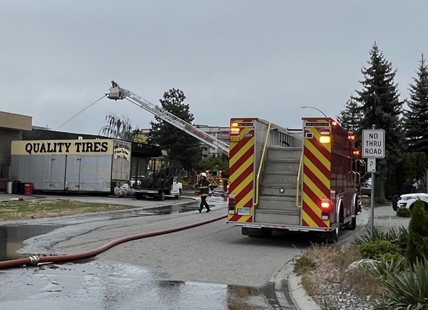Grand Forks senior talked out of her home wins case against notary, winery
An 84-year-old B.C. woman has won a legal battle against a failed Kootenay winery and the notary that did the paperwork after a property deal signed more than a decade ago was deemed by a B.C. judge to be unfair. B.C. Supreme Court Justice Karen Horsman found that the information...

An 84-year-old B.C. woman has won a legal battle against a failed Kootenay winery and the notary that did the paperwork after a property deal signed more than a decade ago was deemed by a B.C. judge to be unfair.
B.C. Supreme Court Justice Karen Horsman found that the information 84-year-old Jean Canfield got prior to the property transaction didn't allowed her to make a "meaningful choice" before signing the agreement.
The case goes back to 2012 when Canfield agreed to transfer ownership of her home in Grand Forks to a newly formed wine company, Bronze Wines.
The property was transferred at a value of $465,000 and the agreement said she would receive a future stream of monthly income once the winery was established, but for the first two years the payments were deferred.
At the time, Canfield was in a living facility in the Lower Mainland and recovering from hip surgery.
According to the April 5 decision, Canfield had never met Scot Stewart who owned the wine company, but he was a friend of her son-in-law.
The agreement stated that if Bronze Wines missed three consecutive monthly payments Canfield could foreclose and reclaim the property.
"This security proved to be wholly ineffective," Justice Horsman said in the decision. "Bronze Wines had no assets... Mr. Stewart had limited income and assets. He had no experience in the wine-making business."
A year after signing the deal, Bronze Wines took out two mortgages on the property for more than $400,000.
Ultimately the whole wine venture failed and in 2019, the property was sold and the net proceeds of $338,000 were paid to the court.
Litigation over the agreement started in 2014 with Canfield suing various parties over the failed deal.
The lengthy 76-page decision goes through different parties' roles in the venture as Canfield argued for compensation.
And after a three-week trial, the Justice ruled some aspects in her favour.
"This contracting process did not take place on a level playing field," the Justice said. "Unbeknownst to her, she was agreeing to transfer her only asset of any significant value to Bronze Wines in return for an unsecured stream of future income that was dependent on the financial success of a wine-making business operated by someone with no income, assets, or wine-making experience."
The defendants argued Canfield was an experienced real estate investor who was "entirely capable" of looking after her own interests in the process.
The Justice disagreed.
"The fact that Mrs. Canfield and her husband may have purchased properties in municipal tax sales many decades ago does not counter the vulnerable position she was in during this contracting process," the Justice ruled.
"The terms of the agreement, which are more favourable to Bronze Wines than to Mrs. Canfield, offered Bronze Wines, a corporation with no assets, a generous two-year payment holiday as well as a 20 to 40-year amortization period to repay the purchase price without providing any real security or an agreed interest rate. In the context of Mrs. Canfield’s situational vulnerability... she could not have understood or appreciated the meaning or significance of the contractual terms, as well as how they unduly disadvantaged her position."
In effect, Mrs. Canfield agreed to transfer the only asset she owned of any significant value, with no assurance of receiving anything in return," the Justice said.
While the Justice decided Bronze Wines is responsible for the shoddy contract, the Justice also assessed whether the notary that facilitated the deal was also liable.
The now-retired notary, Howard Engman, said he had no memory of his meeting Canfield in 2012 and didn't take any notes.
Without any precise details, Engman testified about what his standard practice would have been.
The decision talks at length about what steps the notary is supposed to take to make sure a signatory understands the document they are signing.
Justice Horsman poked holes in Engman's testimony and found his evidence to be unreliable.
The Justice then found that Engman did not take steps to ensure that Canfield understood the document she was signing.
"If Mr. Engman had insisted that Mrs. Canfield receive independent legal advice before he witnessed her signature on the (agreement) then she would have had the opportunity to have the unconscionable agreement rescinded before the transfer of the property had occurred," the Justice said. "But for Mr. Engman’s breach of duty, Mrs. Canfield would have avoided the loss of her property to Bronze Wines. She could have sold it in the ordinary course for its full market value. I find, therefore, that the evidence establishes that Mr. Engman’s breach of his standard of care was a factual cause of Mrs. Canfield’s injury."
Ultimately, the Justice ruled that both Bronze Wines and the notary are responsible for the failed deal and have to pay Canfield compensation of $465,000.
However, the Justice didn't decide how much of the $465,000 each party will have to pay, leaving the case to no doubt go back to another lengthy court dispute.
To contact a reporter for this story, email Ben Bulmer or call (250) 309-5230 or email the editor. You can also submit photos, videos or news tips to the newsroom and be entered to win a monthly prize draw.
We welcome your comments and opinions on our stories but play nice. We won't censor or delete comments unless they contain off-topic statements or links, unnecessary vulgarity, false facts, spam or obviously fake profiles. If you have any concerns about what you see in comments, email the editor in the link above.

 Valandos
Valandos 















